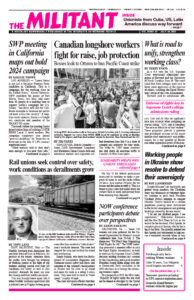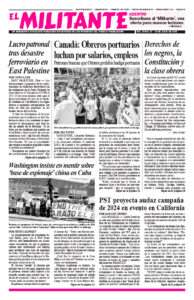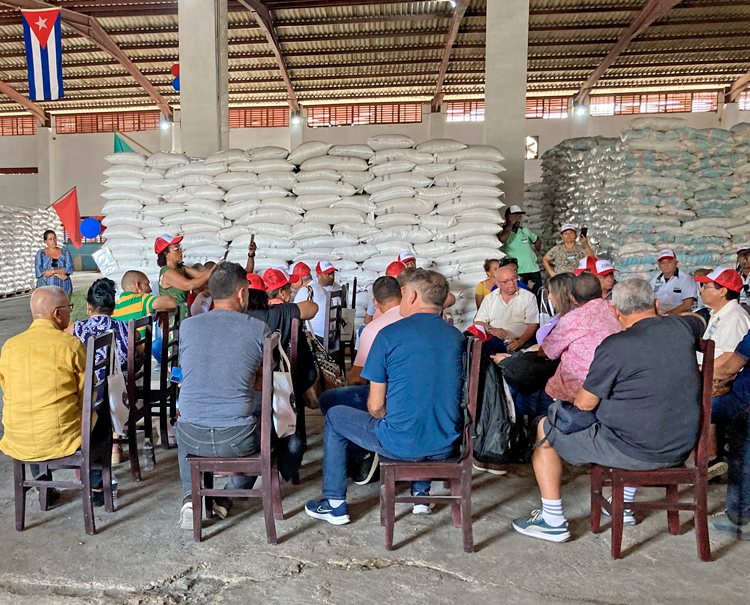HAVANA — Some 100 trade union representatives and members of labor and political groups from 11 countries in Latin America and the United States exchanged experiences here during an April 24-28 workshop hosted by the Central Organization of Cuban Workers (CTC) and the World Federation of Trade Unions.
They discussed the challenges faced by the labor movement in the face of the capitalist bosses’ assaults on wages and working conditions and how to make maximum use of the opportunities to build solidarity for workers’ struggles.
Cuba, where workers and farmers hold power, is the only country where the government encourages the unions to fight to improve safety and conditions and to build solidarity with fellow fighters around the world.
During sessions and informal discussions participants shared experiences about the consequences of bosses’ assaults on the eight-hour workday, safety conditions on the job, overtime pay, multi-tiered wages and benefits, and the widespread outsourcing of work to nonunion contractors to weaken the unions.
One trade unionist from Panama reported on ongoing efforts by unions there against government attempts to increase the retirement age and lower social security pensions. Over the last two decades many governments in the region have taken similar steps, and have pushed private retirement funds as opposed to government responsibility, which have brought disastrous results for workers.
Among the common challenges noted by participants were bureaucratic and factional divisions that undermine union power. “Sometimes there is a strike a few blocks down the street from our workplaces but we don’t bother to stop by to show support,” said the Panamanian trade unionist in one of the workshop sessions. “We need to rescue the practice of sending solidarity messages, make a financial collection, help others’ struggles.”
Ernesto Freire, regional director for the Americas of the World Federation of Trade Unions, told an April 27 meeting of workshop participants about leadership questions that need to be addressed in building the trade unions.
One of the main challenges, he explained, was the tendency of different political currents within the WFTU to each form their own unions. “They end up with multiple unions in the same factories and industries,” he said, “and even several trade union federations in the same country. And they don’t work together.”
Union struggles in U.S.
Participants were interested in hearing about last year’s nation-wide fight for a contract by rail workers in the U.S., the March school workers strike in Los Angeles and the ongoing struggle by Teamsters-organized workers at United Parcel Service to win a contract that protects them from some of the worst job conditions they face. They were also interested in the unfolding struggle by rail workers and working people in East Palestine, Ohio, following the derailment, toxic fire and social catastrophe in February, which has won rail union support.
Chemical workers from Brazil attending the workshop described their 12-year fight for compensation for workers exposed to chemicals used to make pesticides at a plant owned by Shell Oil and German chemical company BASF in Sao Paulo. Ground water was contaminated, affecting surrounding communities. From 1974 to 2002 the company hid the risks from exposure and misrepresented the results of workers’ medical exams. After a fight, the companies were ordered to pay compensation to 1,068 former workers in 2013 and provide them with lifetime medical care.
Solidarity with Cuban Revolution
“I came to extend solidarity, share experiences, and to do my part to get rid of the sanctions” imposed by Washington against Cuba, said Milton Ayala Castro, president of the National Federation of Small-Scale Fishermen Organizations of Ecuador. “I never thought I would find people from the U.S. here with so much experience and appreciation for Cuba.”
Among trade unionists from the United States participating in the workshop were Michael Vera, a member of the Inlandboatmen’s Union in California; members of Carolina Amazonians United for Solidarity and Empowerment, who are involved in organizing efforts at Amazon in North Carolina; members of Amazon Labor Union in Staten Island, New York, including Chris Smalls, ALU president; and Bernie Senter from Los Angeles and Joanne Kuniansky from New Jersey, both members of the Bakery, Confectionery, Tobacco Workers, and Grain Millers union and the Socialist Workers Party. They were part of a group organized by the Los Angeles US Hands Off Cuba Committee, which also included members of the United Steelworkers, Los Angeles Tenants Union and other groups.
Before becoming a tugboat captain in California and a member of the International Longshore and Warehouse Union Marine Division, Vera grew up working on fishing boats in Alaska, and later in San Pedro, California. Vera and Ayala, from Ecuador, exchanged experiences about the way small fishermen are squeezed — from the high prices they face in running their operations, low prices they receive for their catch, and struggling to pay back bank loans necessary to buy boats and equipment. “We even had to go out fishing on Christmas to meet our contract obligations with the owner of the bank note,” Vera said.
Participants also learned about the role Cuban trade unions play in defending workers’ interests as they fight to strengthen Cuba’s socialist revolution.
A group of unionists from Argentina, Brazil, Colombia, Niger and the U.S. visited a food warehouse and distribution center in Havana. The center is responsible for the distribution of staples, including rice, beans, sugar, coffee, pasta and other goods at subsidized prices. They also supply hospitals, child care centers and other state institutions in the area at virtually no cost.
The warehouse was two-thirds empty, a sign of the tightening of Washington’s draconian economic embargo against the Cuban people, which has led to sharp shortages of food supplies, fuel and medicines. Betzaida Castellanos, a CTC leader accompanying the delegation, said, “In previous years the warehouse was usually filled with products all the way to the ceiling.”
In an effort to reduce the impact of the shortages on the population, the warehouse operates seven days a week to offload shipments as soon as they arrive and prepare them for rapid distribution. Much of the work is done by workers using their hands. “We have to do it because the forklifts are not working due to the lack of parts and batteries because of the U.S. embargo,” Pedro Simón Rodríguez, general secretary of Cuba’s Commercial, Restaurant and Service Workers Union, told us.
Bernie Senter contributed to this article.


